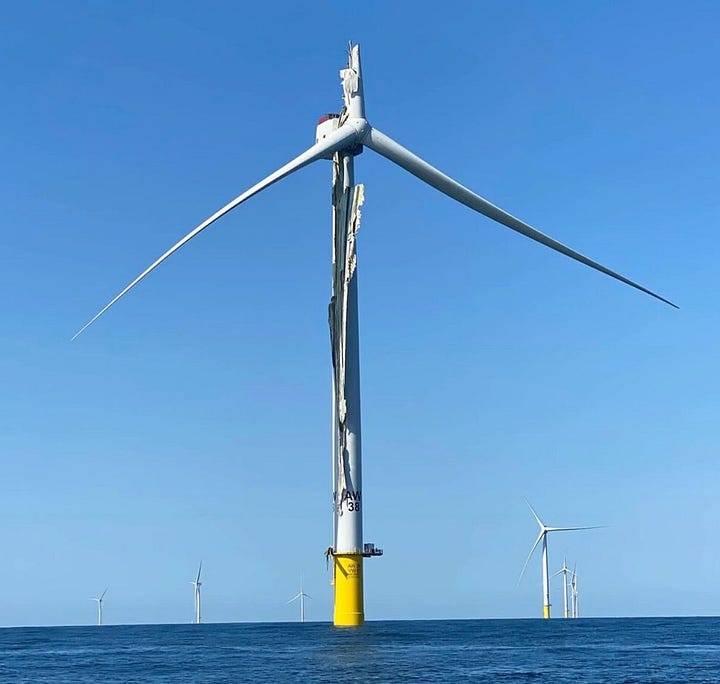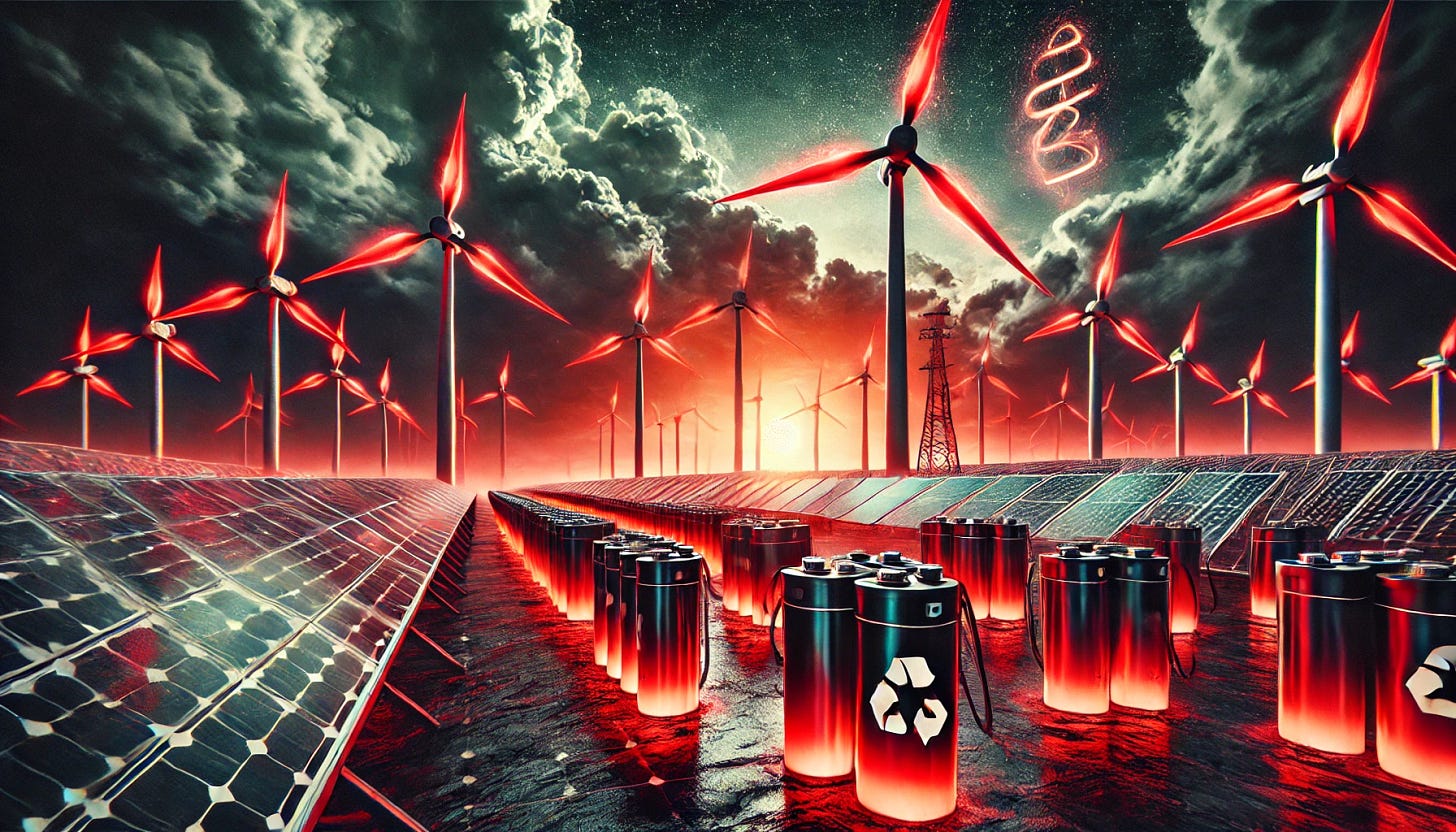Greenwashing Catastrophe
It's Not Green Energy; It's Blood Red.
Welcome to Polymathic Being, a place to explore counterintuitive insights across multiple domains. These essays explore common topics from different perspectives and disciplines to uncover unique insights and solutions.
Today’s Topic addresses the advertising of the Green Energy movement and the reality that underlies our drive for environmental stewardship. A simple investigation quickly uncovers that the materials used for green initiatives are, instead, blood red.
Intro
I’m a stalwart environmental steward. I’m proud of how industrialized nations have cleaned up pollution over the past 60 years, and I’m excited about the use of technologies to continue balancing human and environmental thriving. A challenge emerges when much of the proposed green technology has a worse environmental impact than what we aim to replace.
Very few of you would be shocked if told about the environmental impact of coal or oil, but how many of us know that solar and wind aren’t much better and have other environmental and human consequences that we need to consider in our goals of environmental stewardship?
Black Energy
Let’s start with the carbon footprint of solar. It’s supposed to reduce our carbon emissions however there are critical issues in the data supporting that claim1 as found with the environmental group Ecoinvent:2
Ecoinvent, however, contains no data from China on its photovoltaic industry, even though China makes most of the world’s solar panels. Based on the database, the IPCC claims solar PV emits 20 to 40 grams of carbon dioxide per kilowatt-hour over the life-cycle of the panel. But, an investigation by Italian researcher Enrico Mariutti suggests that the number is closer to between 170 and 250 grams of carbon dioxide per kilowatt-hour, depending on the energy mix used to power PV production. If this estimate is accurate, solar would not compare favorably with controlled natural gas, which is around 50 grams of carbon dioxide per kilowatt hour with carbon capture.
Long story short, China won’t share their emissions data for solar panels so Ecoinvent used German manufacturing data as a proxy. Since Germany has significantly more stringent environmental regulations, it hides the real numbers from China. When researchers compared Chinese car manufacturing emissions to German and then brought that factor back to solar panels it showed that China, which produces 80% of solar panels, has a carbon impact 3-5x worse than natural gas.34
Electric vehicles and Wind suffer similar lifetime CO2 footprint issues as solar and all of them have the added challenge of repairing and recycling these products. We are fast approaching the end-of-life for solar panels that were heavily subsidized twenty years ago and there is still no plan for dealing with those panels when they are removed.5 The same is true for the lithium batteries powering hybrid and electric vehicles where less than 5% are recycled.6
Wind generators are causing ecological problems with mechanical failures on US offshore wind7 causing significant pollution including the annual shedding 180 kg of particulate matter coated with forever chemicals from blade wear.8 Worse, carbon fiber blades cannot be recycled and are buried in landfills instead.9


The more we dig the blacker the green energy becomes a lot like what we found in The Dirty Secret of Recycling in how big companies leverage our desire for environmental stewardship and convince us that recycling works to satiate us into increased consumerism while burying the truth in a landfill. This is the textbook definition of Greenwashing. 1011
Red Energy
Green energy gets worse when we step beyond the carbon impact and look at the larger ecological and political impacts. If our goal is to make the planet better, we need to consider the entire picture.
Solar’s impact is in the sheer volume of land required to host the facilities and their significant ecological impact from increasing nighttime heat, devastation of delicate ecosystems, and more. Solar farms have a long history of being sued first, and primarily by environmental groups because of their significant ecological impacts. Environmental groups acknowledge this greenwashing as this article captures:
America’s biggest green groups are over and over again lining up on the wrong side of decarbonization. The Audubon Society is suing to block California wind farms. The Natural Resources Defense Council supported closing nuclear power plants in New York and California.. The Sunrise Movement is supporting a moratorium on large solar projects in Amherst, MA. And the Sierra Club has organized opposition to solar projects in Florida, California, Maryland and elsewhere.
In Nevada, the Sierra Club and groups like it were the primary challenger to a 14-square-mile solar project. The reason? Affection for the plot of land, which also shelters endangered tortoises. 12
Wind power has a well-known impact on wildlife as we have seen with migratory birds,13 whales,14 and even insects.15 There’s even more effect within the electromagnetic spectrum16 with very little research conducted on the secondary and tertiary order effects. We’ve accepted that they must be better than fossil fuels and more research is politically problematic to that position.
In Tucson, environmental groups are constantly suing to stop a copper mine while also advocating more electric vehicles, wind, and solar production. The irony is that this mine is beholden to U.S. environmental and employment regulations and the alternative, overseas, are not. Inner Mongolia has become a toxic hellscape17 as China pulls rare earth materials that feed green energy and other tech from the ground with no care and they aren’t alone:
Indonesia’s massive metals build-out is felling the forest for batteries18
Indonesia, Brazil biggest culprits in tropical forest loss linked to industrial mining: study19
Indonesia lost more tropical forests to mining than anywhere20
The worst catastrophe isn’t even in the blood of our wildlife but in the blood of our fellow humans who are exploited around the world to extract minerals to support batteries and electrified systems. When we block mineral extraction in the U.S. and still demand those minerals for green energy initiatives, other nations step forward to provide them. This is what it looks like when it’s not in your backyard:
It’s easier to ignore when it happens in central African countries you’ll never go to by Chinese companies you don't invest in. The recent book Cobalt Red: How the Blood of the Congo Powers Our Lives by Siddharth Kara unwaveringly faces the reality of what’s happening in Africa to provide the critical elements needed for green energy. Simply put it’s clawed from the ground by child and contemporary slave labor causing some of the worst ecological conditions on the planet.21
Not only is the push for green energy driving exactly the opposite in environmental impact, but it’s also creating massive secondary and tertiary order effects politically, economically, and socially. As Quillette eloquently captured in Green Dreams, Inflationary Realities:
“We must find ways to combat climate change without incurring devastating inflation, greater class division, the immiseration of the middle class, and the destitution of the poor.”22
Summary
Green energy is not environmentally friendly nor is it socioeconomically, politically, or morally friendly. If our goal is to help heal the planet, it’s clearly off on the wrong track. Like with recycling, we need to fully understand the impact of our environmental zeal and consider whether what we’ve been told is helping, really is.
In most cases, the attraction of driving that hybrid or electric vehicle, the good feeling of installing solar, and the ease of online advocacy satiate us into a sense of complacency that we are actually having a positive impact on the environment. Sadly, the opposite is often true. Our complacent advocacy is actually worse than the fellow who doesn’t care about the environment as much as you. Ironically, their use of grid power, gas vehicles, and not recycling is typically less environmentally catastrophic than the average Whole Foods shopper.
We can do better and we need to hold our politicians and corporations accountable to do better. I don’t want to drive a car created on the backs of slave labor and at the expense of toxic wastelands out of sight and out of mind overseas. Do you?
Enjoyed this post? Hit the ❤️ button above or below because it helps more people discover Substacks like this one and that’s a great thing. Also please share here or in your network to help us grow.
Polymathic Being is a reader-supported publication. Becoming a paid member keeps these essays open for everyone. Hurry and grab 20% off an annual subscription. That’s $24 a year or $2 a month. It’s just 50¢ an essay and makes a big difference.
Further Reading from Authors I Appreciate
I highly recommend the following Substacks for their great content and complementary explorations of topics that Polymathic Being shares.
Goatfury Writes All-around great daily essays
Never Stop Learning Insightful Life Tips and Tricks
Cyborgs Writing Highly useful insights into using AI for writing
Educating AI Integrating AI into education
Mostly Harmless Ideas Computer Science for Everyone
Colum, C. P., & Booth, L. (2023, July 3). Solar panels are three times more carbon-intensive than IPCC claims. Environmental Progress. https://environmentalprogress.org/big-news/2023/7/3/solar-panels-are-more-carbon-intensive-than-experts-will-admit
Institute for Energy Research (2023, August 1). Misleading carbon data benefits China’s solar industry. https://www.instituteforenergyresearch.org/international-issues/misleading-carbon-data-benefits-chinas-solar-industry/
Mulvaney, D. (2014, November 13). Solar energy isn’t always as green as you think. IEEE Spectrum. https://spectrum.ieee.org/solar-energy-isnt-always-as-green-as-you-think
International Energy Agency. (2022). Solar PV global supply chains (Executive summary). IEA. https://www.iea.org/reports/solar‑pv‑global‑supply‑chains/executive‑summary
Atasu, A., Duran, S., & Van Wassenhove, L. N. (2021, June 18). The dark side of solar power. Harvard Business Review. https://hbr.org/2021/06/the-dark-side-of-solar-power
Ritchie, H. (2023). The battery recycling myth. Sustainability by Numbers. https://hannahritchie.substack.com/p/battery-recycling-myth
Bryce, R. (2024, July 22). Breaking wind. Robert Bryce. https://robertbryce.substack.com/p/breaking-wind
Cloosterman, A. (2022, July 2). The many health hazards of wind turbines. Clintel Foundation. https://clintel.org/the‑many‑health‑hazards‑of‑wind‑turbines
Martin, C. (2020, February 5). Wind turbine blades can’t be recycled, so they’re piling up in landfills. Bloomberg News. https://www.bloomberg.com/news/features/2020‑02‑05/wind‑turbine‑blades‑can‑t‑be‑recycled‑so‑they‑re‑piling‑up‑in‑landfills
Woudenberg, M. (2024, February 4). The dirty secret of recycling. Polymathic Being. https://www.polymathicbeing.com/p/the‑dirty‑secret‑of‑recycling
Greenwashing was most notable for me while researching this article. Normally I can get most of my research through Google, but for this article, I had to use DuckDuckGo and Brave search engines along with Google and LLMs to find a centered position. LLMs were notoriously biased toward showing the accurate data I’ve shared while still parroting the greenwashing justifications.
Nowinski, W. (2022, January 14). America’s top environmental groups have lost the plot on climate change. Noahpinion (Substack). https://www.noahpinion.blog/p/americas‑top‑environmental‑groups
Ritchie, H. (2024, January 31). How many birds do wind farms kill? Sustainability by Numbers (Substack). https://www.sustainabilitybynumbers.com/p/wind‑power‑bird‑deaths
Quattrocki, E. (2023, November 7). 72 whales have died on the East Coast in a year. NOAA must take action. NorthJersey.com. https://www.northjersey.com/story/opinion/2023/11/07/whale‑deaths‑east‑coast‑noaa‑must‑take‑action/71563035007/
McPherrin, J. (2022, November 15). Wind turbines and wildlife impacts. The Heartland Institute. https://heartland.org/publications/wind‑turbines‑and‑wildlife‑impacts/
U.S. Department of Defense. (2011). Do wind turbines affect radio communications and radar in air and sea navigation? Defense Technical Information Center. https://apps.dtic.mil/sti/pdfs/ADA580765.pdf
Maughan, T. (2015, April 2). The dystopian lake filled by the world’s tech lust. BBC Future. https://www.bbc.com/future/article/20150402‑the‑worst‑place‑on‑earth
Milko, V., Davey, E., & Fassett, C. (2024, July 16). Indonesia’s massive metals build‑out is felling the forest for batteries. Associated Press
Reuters (2022, September 14). Indonesia, Brazil biggest culprits in tropical forest loss linked to industrial mining: study. CNN. https://www.cnn.com/2022/09/14/world/indonesia‑nickel‑mine‑pollution‑climate‑archives‑dst‑intl‑c2e
Bloomberg News (2022 September 12) Indonesia lost more tropical forest to mining than anywhere, Bloomberg https://www.mining.com/web/indonesia-lost-more-tropical-forest-to-mining-than-anywhere/
Environmental Justice Atlas. (n.d.). Kolwezi: Ecological and social problems caused by cobalt mining. https://ejatlas.org/conflict/kolwezi‑ecological‑and‑social‑problems‑caused‑by‑cobalt‑mining=
Cavanagh, M., & Radosz, M. (2022, July 27). Green dreams and dirty realities. Quillette. https://quillette.com/2022/07/27/green‑dreams‑and‑dirty‑realities/








I have always maintained that the most effective way to protect our environment is to use LESS stuff! Buy less. Drive less. Use less electricity. And, etc. The demand for electricity is escalating at a shocking rate. Just AI draws mammoth amounts. As you have written here the materials used to maintain this extraordinary modern life we feel is a 'right', are terribly destructive to extract, effecting the very earth, her population, the soil, let alone the climate. Are we promoting our own ignorance so that we don't feel the guilt? It is complex and scary. I get that. However when I work with families and households to reduce their negative impact on our environment we start with consumption. 'Do you really really need that? How was it made? And where does it go when you are done with it?' Three simple questions before purchase.
You are doing good work with essays like this. I will share! Thank you so much.
Here are my 2 cents and observations:
1. I do not believe ICE vehicles and other human activities are the only reasons for climate change. Earth has gone through these kinds of cycles in the past. Climate change is happening in a very complex system, and trying to pick only human activities as the reason is like looking for a simple explanation for a complex problem, even though we may be one of the top reasons for this change. We also do not know what our planet will do with climate change. We see some indications that hurricanes are becoming stronger and contain more water. CNN:
In the past eight years, eight Category 4 or 5 hurricanes have made landfall on US soil.
That’s as many as the entire 57 years that came before it.
2. We will not reduce CO2 emissions without lowering consumption. I have noticed that people who buy EVs and install solar panels drive more and use more electricity than others.
3. When we say we have reduced pollution in developed countries, we should consider that in several cases, we have increased pollution in other parts of the world by the same amount or more as we moved manufacturing to other countries, so I am not sure if I can call it an absolute reduction.
4. We should be ready for the unintended consequences of these technologies, which will emerge over several decades.
5. My other fear is that we may prematurely lock into these technologies as we did with ICE and stop looking for alternatives or developing better technologies.
6. Also, we have not spent much time considering about the job losses these technology transition will cause and their consequences.
7. Current green technologies require a significant initial outlay to install or procure. Even with the subsidies, I do not think it is a long-term sustainable option. Norway will be a great place to look for the long-term challenges with a subsidy model.
8. I have also noticed that people buying solar panels and battery backups to install on their roofs do not account for the cost of solar panel maintenance/replacement, and the battery will also eventually die and require replacement. I know a little about construction, so I do not know how much it would cost to reinstall solar panels if you need to replace the roof. I spoke to a few people I know, but their reaction was more like, "I may not be in this house when it will be needed."
9. The critical minerals for these technologies are primarily in politically unstable countries, like Congo, which can make obtaining the minerals challenging if the geopolitical situation worsens. China will play a significant role, and I am unsure if any developed country has a good relationship with them.
10. Adapting these technologies will require behavior changes, such as reduced consumption and lifestyle changes, but asking people not to do something they are used to is much more complicated.